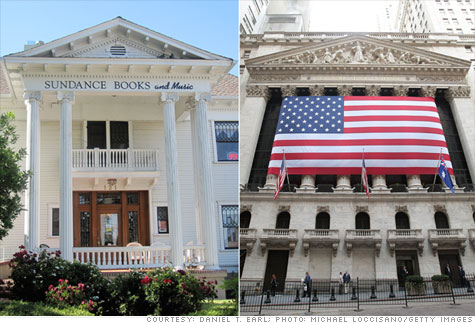
The Sundance Bookstore (L) in Reno, Nev., sees customers buying less, because the volatility on Wall Street (R) makes them jumpy.
NEW YORK (CNNMoney) -- The nerve-racking volatility of the stock market has been making small business owners, well, nervous.
The market has been down 600 points, up 400, down 500 and up again 400. The chaos has translated into smaller sales for small business owners as consumers curb their buying.
The impact of the market's wild swings on mom and pop businesses is not so easily seen, because they are not publicly traded. But there is an impact and not necessarily a good one.
"When things are getting dicey or tough, we feel things pretty immediately," said Christine Kelly, owner of the independent Sundance Bookstore in Reno, Nev. Books are not a necessity, so when consumers are looking for places to trim their budgets, they buy fewer books, she explained.
The drawn out debate over the debt ceiling, as well as Standard & Poor's recent and unprecedented downgrade of U.S. debt also has eroded consumer confidence.
"When you see people concerned about investing or concerned about their faith in the American government to get things in line, I think people save," said Kelly. It doesn't take long for customers to shut their wallets after getting spooked. "This stuff is immediate," she said.
Smaller jobs: A tumultuous stock market also affects real estate and the small companies in that sector.
"A lot of times if somebody is moving into this area thinking about building a new home, nine times out of 10 they have the majority of their money invested in the stock market," said Ronnie Potter, co-owner of construction company, Potter Sunderland Construction in Louisville, Tenn. "And if it goes down for a few weeks, they could lose 25% or 30% of the money they were planning on using to build a new home, so it is a very direct effect."
Potter's firm started in 1993, and he used to do mostly custom homes. Now, his business is primarily renovations and remodel jobs because consumers don't have as much money to spend.
"You do whatever you have to do to keep the company alive," said Potter.
Patience is a virtue: Wayne Spivak isn't worried about losing clients. But the swings in the market mean he may have to work harder to win new ones.
"A lot of small businesses are hesitant to make what they deem to be a bold move, because they don't know what is happening," said Spivak. "That volatility is driving everybody crazy."
Spivak's clients are small businesses with between $1 million and $175 million worth of revenue. He started SBA * Consulting in 1990, which now has six offices with a staff of two full-timers and 45 independent contractors. SBA * Consulting provides part-time chief financial officer services to small businesses that can't afford a full-time CFO.
"They need a CFO, but they can't afford somebody five days a week, so we go in one day a week, two days a week," said Spivak. His sales team might have to make more visits to a potential client and the small business may take longer to sign on, he said. "I am going to see longer sales cycles, but I am going to see much more business."
A surprising upside: Pablo Solomon, an artist and designer living outside of Austin, Texas, makes his living selling his drawings and sculptures. He does not have a storefront, but communicates with his clients through the Internet from his ranch.
Customers who purchase less expensive items -- like prints or reproductions -- have been buying less -- the result of an uncertain economy.
But his well-off customers -- which include billionaires -- are buying more.
"They are trying to figure out what to do with their money other than buying gold and platinum," said Solomon. "They will buy art, and they will buy good art."
These wealthy investors are looking for places to store value, he explained. They are also spending their money on luxuries they can enjoy, like vacations, art or sports cars.
"Every time the stock market bounces, they are going out and buying stuff they always wanted," he said. ![]()